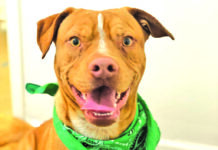
There is nothing cuter than a tiny puppy, with its soft fur, puppy breath, feet too big for its body, adorable face, razor-sharp teeth, pooping and peeing everywhere. Those puppy teeth will be chewing on everything from your favorite shoes to the leg of your dining room table. And don’t forget the potty-training and the non-stop whining and crying at night as it learns the family routine. Puppies are a lot like babies. They take a lot of training and more patience than I have at my age. Don’t get me wrong. I love puppies. I’ve raised puppies. But let me tell you, if you want to get a baby dog, be forewarned about the work it takes. So what will it take (out of you) to raise a puppy?
Before you bring home your cute little fur ball, you need to puppy-proof your home, a process very similar to toddler-proofing a home. Get an idea of the puppy-eye-view of your home. Electrical cords, potential toxins and breakable items should be placed completely out of reach. Remember that your puppy can jump, climb, chew and scratch, so place what you can high up or in a locked cabinet. Child-safe latches don’t really work on curious and determined puppies. It’s best to secure cabinets and drawers with locks or metal hardware. Basically, it should be chew-proof and require opposable thumbs to operate. Proper puppy-proofing not only keeps your dog safe, it also gives you peace of mind.
Your new family member will need certain items from the start. Some are essential, while others are not necessary, but helpful all the same. The most important items include a leash and collar with your contact information and your pup’s name. If you adopt a puppy from a shelter or rescue, they will usually microchip it as well. It will need food and water bowls, and chew toys. You should also get a nice dog bed and a crate or kennel. Some of these items can last as your puppy ages, but keep in mind that many will need to be replaced when your puppy grows. Be prepared for the expenses associated with dog ownership so that you can budget accordingly.
Chances are good that the first night your puppy is in the home, neither one of you will get any sleep. Dogs are creatures of habit and routine. Your puppy will miss its mother and littermates and feel uncomfortable in the new surroundings. The good news is that once it forms a bond with you, it will sleep like a baby. How long that may take varies. Like a young child, your puppy has little control over its emotions and even though it may cry, scolding it will do nothing but cause it to fear you. If your puppy cries for you to come for the first few nights, your constant appearance, whether to comfort or scold, will only serve to reinforce the fact that it can make you appear with its cries. Hard though it may be, resist the urge to go to it.
Housebreaking is one of the first things you will teach your new puppy. The process can sometimes be challenging. You should begin house-training as soon as you bring your puppy home, but it takes patience. Lots and lots of patience. Puppies can’t control their bladders and bowels until about 12 weeks of age. Starting early can help get your puppy on a routine. As it grows and develops control over its bodily functions, it will already know what to do. As a general rule, you should take your puppy outside immediately after eating or drinking. However, accidents happen, so be prepared, consistent and patient.
Your puppy’s first vaccinations help it build up immunity to disease. Most puppies receive the rabies shot, as well as a combination vaccine known as DHLPP. Administered as a series of shots, this vaccine guards your pup against distemper, hepatitis, leptospirosis, parainfluenza and parvovirus.
Dr. Larry McDaniel, DVM for the Purina Animal Instincts says, “In order to keep up his immunity up, your dog will probably get these shots every year for the rest of his life. But talk to your veterinarian about what’s best for your pet. Some vets recommend that adult dogs get re-vaccinated less frequently. And depending upon where you live and where you to plan to take your dog, your pet may also need to be vaccinated against corona, Lyme disease, kennel cough or giardia.”
Remember to get your pet licensed with the city. According to Friends of the Culver City Dog Park, “Without identifying information, pets separated from their human companions cannot be reunified with their families. Each year, many more puppies and kittens are born than can be adopted. To help resolve these issues, Culver City has launched Project ARF, an in-house licensing program. All dogs and cats must be licensed. To be licensed, each pet must be (1) vaccinated, (2) spayed/neutered and (3) micro-chipped. Annual License fees: $20/dog and $10/cat.”
And of course, don’t forget obedience training. There is nothing worse than an ill-behaved puppy, except maybe an ill-behaved dog. Starting early with training will ensure that it recognizes you has the leader of its new pack and also help with the bonding process. Many of the local pet stores offer weekly classes.
Now that you know more about what it takes to keep your puppy happy and healthy, have fun searching for your new best friend. Petfinder.com, the local animal shelters and even the Culver City News are great places to start your search. Good luck!












